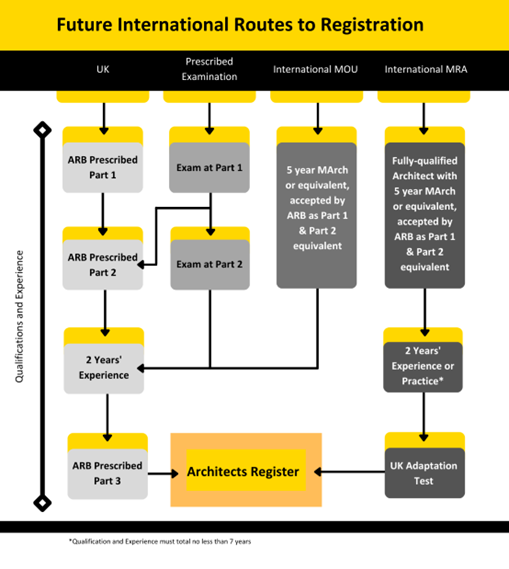UK Adaptation Assessment
Results updated 2 Nov 2022
We have analysed responses to the consultation and have published an outcome report. This sets out our analysis of the consultation.
We will now develop the new procedures with this feedback and test them with a pilot of the assessment, before publishing a final version of them early next year. They will then become effective once the new international routes are opened.
Links:
Published responses
View submitted responses where consent has been given to publish the response.
Overview
Introduction
The ARB is an independent professional regulator, established by Parliament as a statutory body, through the Architects Act, in 1997.
We are accountable to government.
The law gives us a number of core functions which include:
- Ensuring only those who are suitably competent are allowed to practise as architects. We do this by approving the architecture qualifications required to join the Register of architects.
- Maintaining a publicly available Register of architects so anyone using the services of an architect can be confident that they are suitably qualified and are fit to practise.
- Setting the standards of conduct and practice the profession must meet and take action when any architect falls below the required standards of conduct or competence.
- Protecting the legally restricted title ‘architect’.
This consultation
Changes to the law will allow ARB to create new international routes to registration.
Our proposed approach to these includes a new ‘UK Adaptation Assessment’. This would assess an applicant’s understanding of the UK-specific context of practising architecture, ensuring that anyone who joins the Register via these new routes meets the standard required to practise safely and effectively in the UK. This includes their understanding of UK legislation, building regulations and the construction sector.
This consultation asks for views on our proposals for the assessment, including the requirements to access it and our plans for how the process will operate.
These proposals are set out in the procedures document here.
Background
In recent years we have run two separate processes and routes to registration for those holding non-UK qualifications (in additional to the UK route) based on the legal framework:
- an EU route based on the Mutual Recognition of Professional Qualifications Directive (MRPQD) which created an automatic right to registration for most EU architects
- an international route where architects qualifying outside the EU were required to complete ARB’s Prescribed Examinations, as well as complete an ARB-recognised Part 3 qualification.
Following the UK’s exit from the European Union, we have been developing a new approach to registration of international architects, which we intend to implement once all of the relevant legislation to enable us to do so is in place.
The Professional Qualifications Act 2022 provides a framework that will give ARB the power to enter into mutual recognition agreements (MRAs) as soon as additional secondary legislation is in place to ‘switch on’ the powers that we will need to sign agreements.
We consulted on our new approach to registration of international architects between October 2021 and January 2022, seeking views on our aims and objectives, our principles and our proposed decision-making process.
The feedback from stakeholders was supportive and a copy of the report which we published following the consultation is available to view here. Since that time, we have been working on establishing a process to deliver this new route. This process includes the new ‘UK Adaptation Assessment’.
The UK Adaptation Assessment
The UK Adaptation Assessment would provide reassurance that individuals who have qualified overseas understand what is necessary for safe and effective practice in the UK.
It would do this by assessing an applicant’s understanding of UK-specific legislation, regulations and the context of UK practice. For example, the proposed assessment criteria includes topics like the role of clients and users, the legal context within which an architect must operate, knowledge of UK construction and contract law, and the roles of built environment professionals.
If we enter into an MRA with an international counterpart organisation, there will already be substantial alignment between our respective qualifications and practical experience requirements. We therefore believe a lighter-touch approach to assessing applicants’ understanding of the UK-specific context is appropriate.
The UK Adaptation Assessment has been developed to provide an assurance that requirements equivalent to those ordinarily demonstrated by obtaining UK Part 1, Part 2 and Part 3 qualifications have been satisfied. The diagram below illustrates where the UK Adaptation Assessment will be required within the new international route:

What we are asking
In order to operationalise the UK Adaptation Assessment, we have drafted the 'UK Adaptation Assessment Procedures'. These are based on the approach we previously consulted on.
The Procedures are rules of the Board, setting out the context for the assessment process, how to access the UK Adaptation Assessment and how the process will operate. They are set out in the procedures document here.
We are seeking views on these and are particularly interested in:
- Whether the proposed UK Adaptation Assessment Procedures accurately and fairly deliver an assessment process which reflects our aims and objectives? Those aims and objectives are available to view here.
- Whether there any sections of the UK Adaptation Assessment Procedures which may be unfair or discriminate against people with particular protected characteristics?
- Any other comments about the proposed UK Adaptation Assessment Procedures.
The consultation will comply with ARB’s Code of Practice for consultations. We have, however, decided to issue this consultation for a period of six weeks as opposed to three months. We need to do this in order to ensure that the Assessment Procedures make their way through our governance processes in a timely way and to align with the new legislation that will give us powers to operationalise the new routes in early 2023.
What happens next
Audiences
- Anyone from any background
Interests
- Equality Diversity and Inclusion
- International

Share
Share on Twitter Share on Facebook